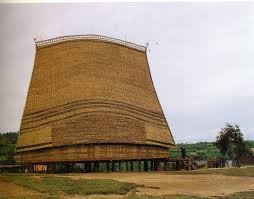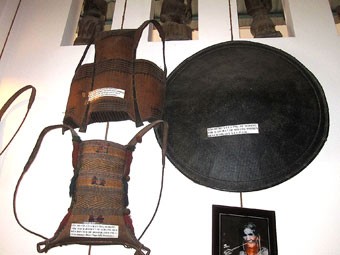 A Rong house of the Xo Dang A Rong house of the Xo Dang
|
The Xo Dang, who speak a Mon-Khmer language called Xo Dang, are one of the largest ethnic groups in the Central Highlands - about 170,000 people. They live mainly in Kon Tum province and scattered in the mountain areas of Quang Ngai and Quang Nam province.
The Xo Dang grow rice and other crops, raise cattle and poultry, collect wild vegetable and fruits, and catch fish. They weave fabric and forge farm tools. Their life and production are largely dependent on nature, so they worship many genies and supernatural forces.
 Musical instruments of the Xo Dang Musical instruments of the Xo Dang
|
Xo Dang men wear loin-cloths and go shirtless. Women wear blouses, skirts, and shoulder scarves. Black is the dominant color of their clothing. Women prefer silver earrings and necklaces and stone-beads around their hips and ankles.
Luong Thanh Son, a researcher of Central Highlands culture, said: “The Xo Dang’s costumes are similar to other ethnic groups in the Central Highlands. But they embroider more flowery images on their costumes. At rituals and festivals, men wrap a scarf over their shoulders like warriors. Women wear sleeveless tops and long dresses. When they dance, the men look powerful and the women are graceful.”
Multiple generations of Xo Dang live together in a long stilt house. They don’t have family names. A prefix of A or U on a name identifies an individual as male. A prefix of Y indicates a female.
The Xo Dang have rich folk art that includes dances, songs, and music. At festivals and New Year celebrations, they play gongs and sing epics about their roots and the history of the Central Highlands. They make many types of musical instruments from bamboo such as the T’rung xylophone, the Klong-put, and various flutes.
Xo Dang festivals are closely associated with agricultural production- for example, the new rice celebration and the crop blessing ritual. A Khao, a Xo Dang man who lives in Ngoc Hoi district, Kon Tum province, said some ceremonies, which used to be performed within the family, have become community events.
The village patriarch hosts the ceremonies and represents the villagers in thanking the genies for giving them bumper crops.
“The Xo Dang in each locality have unique cultural features. Their festivals take place at the beginning of the year after the harvest. In January every family prepares a pig offering to celebrate the new rice crop and pray for abundance,” said A Khao.
The patriarch is a prestigious and respected older man. He chairs community events and represents the villagers in all affairs. Every village has a Rong house which hosts meetings and displays village assets such as gongs and statues of ancestors.